
My Guide to Legally Traveling to Cuba with Your American Passport
Planning a trip to Cuba with an American passport can be overwhelming, even for seasoned travelers! The online info about how to travel to Cuba with American passport and without an agencyis all over the place. Some sources say one thing, some say another. What does it all mean in reality? Does your airline cover health insurance? Will you get in trouble coming back to the US? Do you absolutely have to travel with an agency going to Cuba with American passport? What does “support Cuban people” visa really entail?
So many questions, so few clear answers…
How Can Americans Travel to Cuba Without an Agency?
Yes, American citizens can legally travel to Cuba without an agency. Here is how:
- Research and Choose a Travel Category: Opt for the ‘Support for the Cuban People’ category for a versatile travel reason that benefits local communities.
- Book Flight and Visa/ Insurance: Pick flights that support Cuban people, obtain a “Support for the Cuban People” visa, and don’t forget necessary Cuba-recognized travel insurance.
- Lodging and Tours: Stay in ‘casa particulares’ run by locals to immerse in culture and support the community. Plan activities that engage with local businesses.
- Documentation and Reentry Compliance: Adhere to US travel regulations upon return, avoiding souvenirs linked to the Cuban government. Documentation is key for smooth reentry.Keep detailed records and receipts of all activities and purchases.
In my blog post, I’ll share my firsthand experience traveling to Cuba with an American passport. And provide a detailed itinerary that aligns with the “support Cuban people” visa. Plus +share a perfect itinerary that checks all the boxes for that “support Cuban people” visa. It’s all fun and Constitutionally compliant, I promise.

Going to Cuba with American Passport in 5 Steps
Step 1: Do Your Research
First, you need to ensure you’re traveling for a legitimate reason. The ‘Support for the Cuban People’ category under the U.S. travel regulations is a versatile choice that aligns perfectly with the typical tourist’s interests and gives back to local Cuban communities.
The What, Why, and How of Support for the Cuban People
First off, what does this title even mean? ‘Support for the Cuban People’ isn’t just a fancy government jargon; it’s your golden ticket, your mission statement, and a legal requirement all rolled into one.
Here’s the legal lowdown: your presence in Cuba should foster a warm, ecumenical spirit toward the Cuban civilians, bypassing Cuba’s monolithic businesses for the underdogs.Meet, eat, and retreat in the local casa particulares; dine on mom-and-pop cuisine that tastes of homemade heritage; shop for crafts and souvenirs that are more artisanry, less assembly line; explore, not leisurely, but immersed in the Cuban way of life. The essence is to steer clear of government-run entities to the best of your ability.
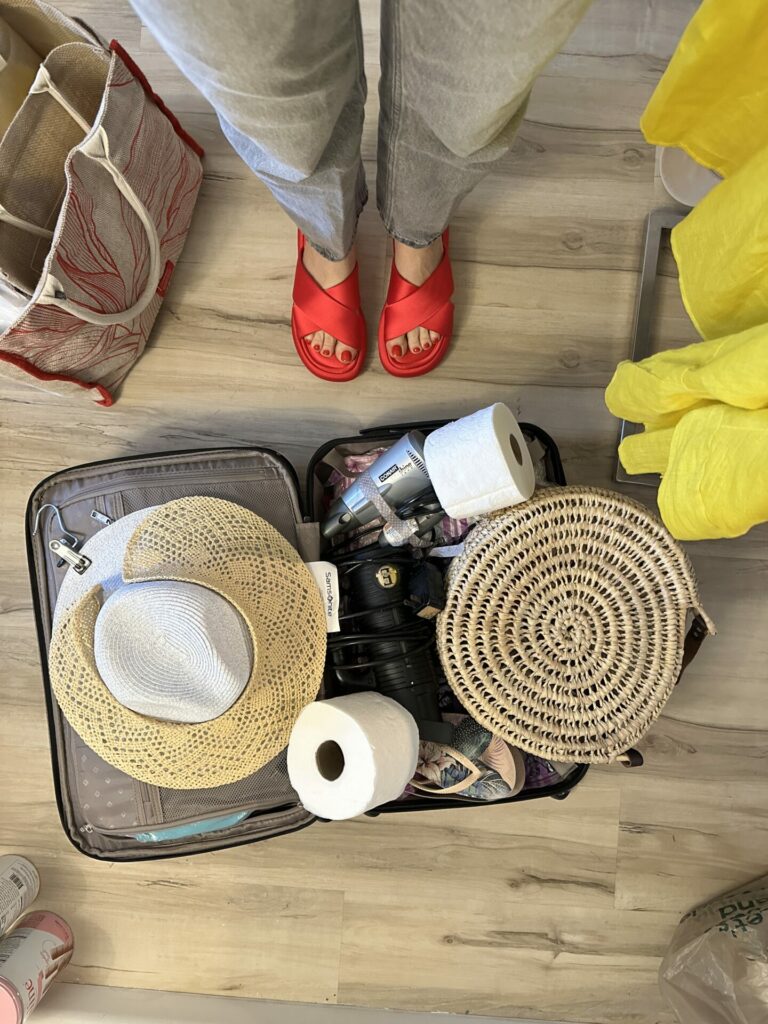

Step 2: Set the Stage -US to Cuba Flight and Visa
1. Sourcing the Right Airfare to Cuba
Since the easing of travel restrictions in 2016, there has been plenty of commercial flights to Havana. American Airlines offer Visa on ou can get right at the airport for additional fee. If you’re using a different airline, they may direct you to an online service. Most flights to Cuba depart from Miami, so it might be worth considering a layover there to ensure you’re on a compliant route.
When booking your flight, choose an option that explicitly supports the Cuban People category. This selection should be clear throughout your booking process and on your ticket itself.
2. Getting your Cuban Visa card
For anyone not on a humanitarian mission or visiting family, you’ll likely need a “Support for the Cuban People” visa. This option is ideal for travelers looking to explore and genuinely contribute to local entrepreneurs’ success.
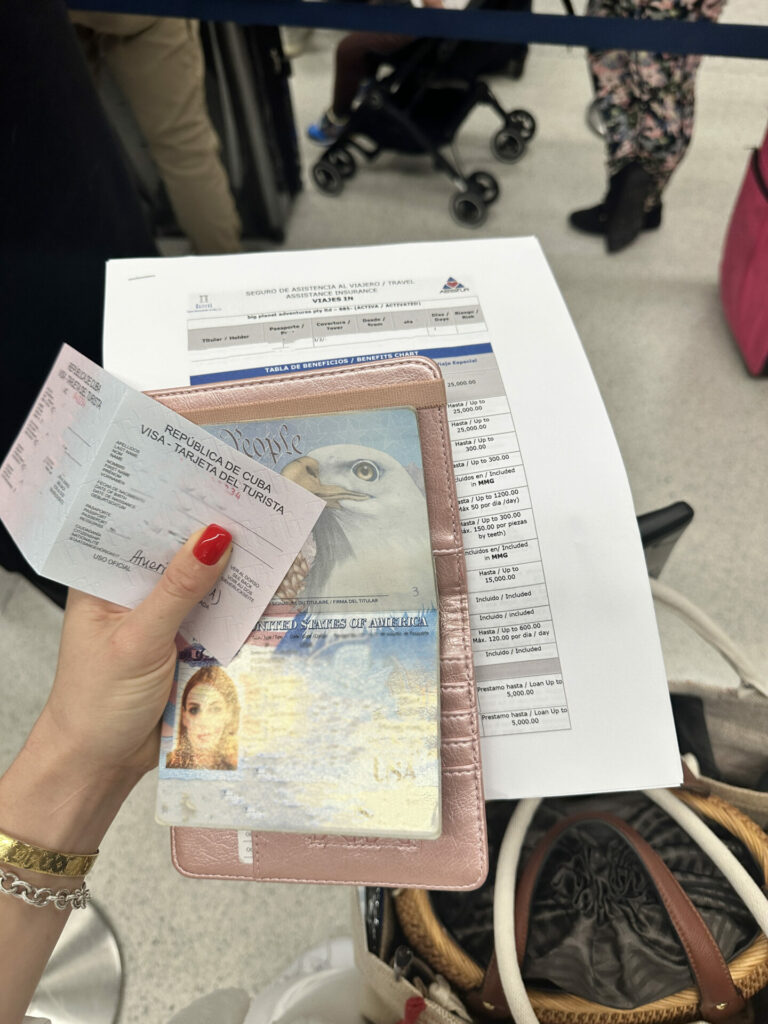
For all my fellow adventurers looking to explore Cuba and make a real difference, this visa option is the way to go. It’s perfect for travelers wanting to support local entrepreneurs and dive into the rich culture.
Travel insurance? Check. Visa? Check. Itinerary? Double-check. Yes, Americans can travel to Cuba legally!
How American can get Cuban Visa without an agency
American Airlines uniquely offers visas directly at the airport for a fee, simplifying the process significantly. If flying with another airline, they may direct you to a partner for visa acquisition, or you can find a visa service online. Expect to pay approximately $80 for the visa, with a potential $20 shipping fee, and plan for at least a week for processing. The process is really easy. Once you receive your Visa card (comes with a travel brochure and “best airport transfer” coupon) fill in the visa by yourself on each side.
3. Cuba Insurance and Why You Can’t Skip It
Travel insurance is a must, but it’s not just any policy. For Cuba, you need insurance that is explicitly recognized by Cuban authorities, which often isn’t included in typical travel insurance policies according to internet. My research unearthed that not all US carriers include this. So I opted for peace of mind and sourced my insurance from a partner agency recommended by Delta airlines. Asistur Insurance is Delta’s preferred insurance partner for Cuba. The $6-per-day premium is a small price to pay. Make sure you’re covered for health, travel, and any other mishaps that could befall the intrepid American in Cuba.
Step 3: Booking Lodging and Tours
1. Booking your Lodging: Where to stay in Cuba
You can’t stay at a joint under Cuban government control, which, currently, includes most reputable hotels. To fully immerse yourself in the Cuban culture and support the local populace, stay in ‘casa particulares’. These are private accommodations run by Cuban locals and are not affiliated with the government.
Now, why you should stay at a casa particular when traveling to Cuba with American passport? Besides being a legit way to stick to the guidelines, it’s your golden ticket to experiencing warm Cuban hospitality right from the source – the locals!
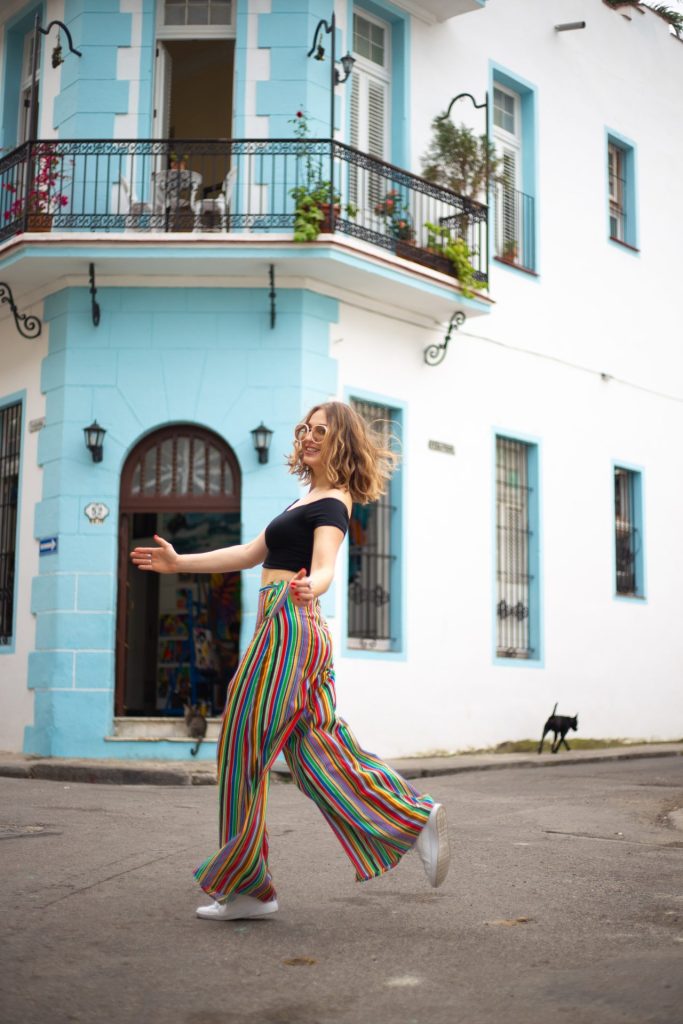

Where to find casa particular for rent? Most listings on Airbnb are actually casas particulares (and so are the experiences) But before you book, have a chat with your prospective host. Make sure they’re flying under the “Support for the Cuban People” flag. Just to be sure.
Plan the perfect Support for the Cuban People itinerary
2. Craft Your ‘Support for the Cuban People’ Itinerary
For a trip with purpose, your itinerary must demonstrate engagement with local businesses and the Cuban community.
Make Your Money Matter
Every meal and trinket you purchase is an opportunity to support Cuban entrepreneurs. Caution, though—keep your receipts and be prepared to discuss your activities with US authorities if asked. Seek out experiences that offer genuine insight into Cuban life. From art classes to music tours, these encounters enrich not only your travels but also the lives of those you engage with.
If you are looking for the ultimate itinerary check out this blog.

Step 4 : Reentry to the US from Cuba
While entering Cuba with an American passport is straightforward, ensure you adhere to US regulations upon your return. The Cuban government may accommodate American visitors without stamping passports and without concern for the purpose of the visit, as long as it’s lawful and economically beneficial to them. However, the US government has specific requirements for travel to and from Cuba, including potential civil penalties for non-compliance, making the return potentially more challenging than the arrival.
No souvenirs please!
Upon your return, what graces your hands should be memories, photographs, and a lone magnet that you purchased at an independent entrepreneur’s souvenir shop. Respect the embargo on items and stay within the legal lines to avoid any post-travel turbulence.
Bringing back anything from Cuban cigars or rum to souvenirs that contain images, brands, or production materials related to the Cuban government is prohibited. While it may seem like a small transgression, U.S. customs take these restrictions very seriously.
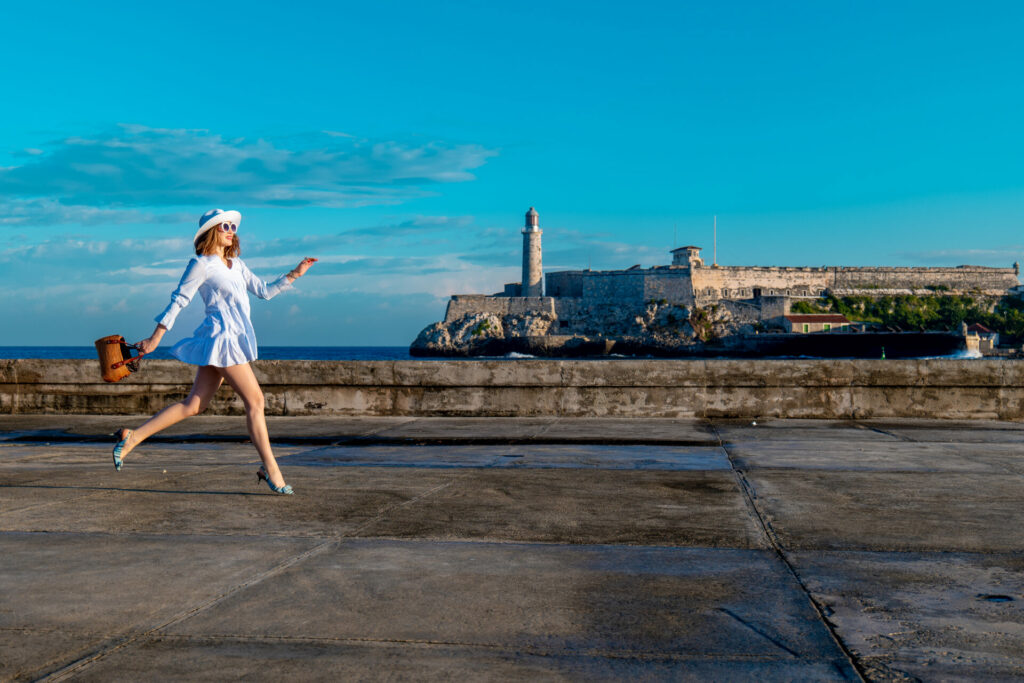
The Security Blanket of Documentation
Complying with the U.S. Treasury is your compass; save receipts, capture moments, and forge an itinerary like an alibi. U.S. officials can inquire up to five years after your trip, so preparedness is prudence. Keep your soles, and your story, clean.
In the world of American travel to Cuba, documentation is more than just peace of mind; it’s your security blanket. Take those photos, check-in at those Support for the Cuban People hotspots, and hold onto the business cards of every private enterprise that crosses your path.

Traveling to Cuba from the US- A Trip Worth the Red Tape
Traveling to Cuba with an American passport isn’t without its complexities. However, the reward of experiencing this beautiful country while legally supporting its people is unmatched.
Like the old commercials from the 50s say, “Cuba…so far and so close,” it truly is close to the US. It’s a shame that there isn’t an easier way to travel, but under the Obama and Biden administrations, the process is not as challenging as you might think once you break it down.
Cuba is marvelous, fun, sunny, exotic, cultural, and artsy cool, with so many things worth exploring. Supporting the Cuban people is not just a box to check; it’s an opportunity to witness resilience and innovation in the face of adversity.
I guarantee you will fall in love with the culture and its people, just as I did the first time with my Russian passport. Now, with my American passport, I’ve returned to show my support in a way that’s not only fulfilling and law-abiding.
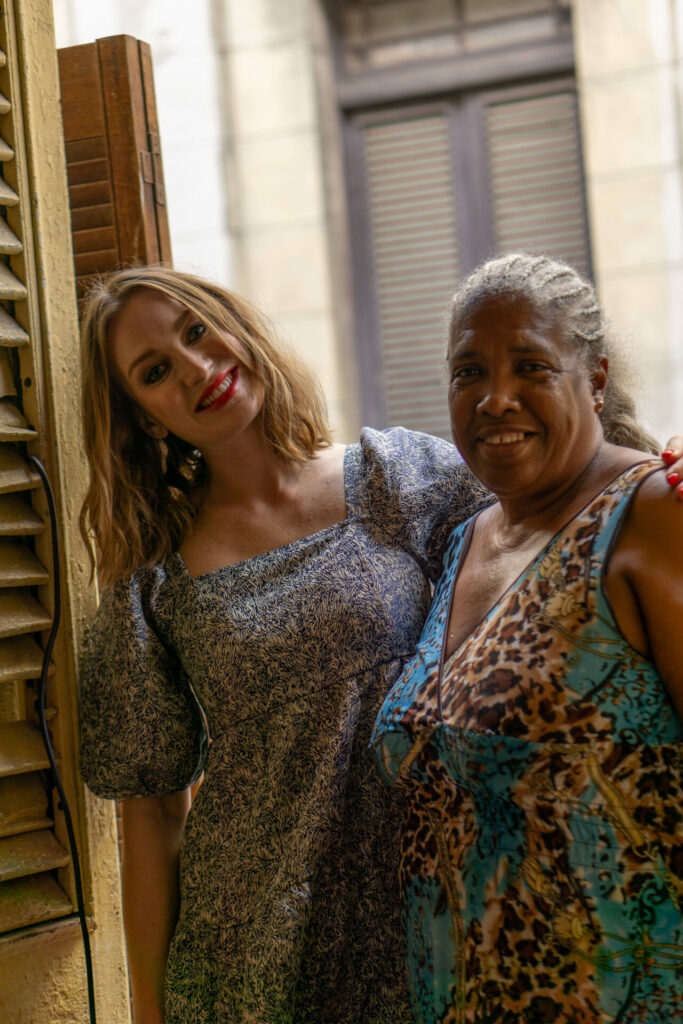
Our photo session turned into a heartwarming conversation.

The Moral of the Legal Travel Story
Cuba isn’t just an island getaway; it’s a colorful culture that invites you to dive in deeper – and now you can, legally. My takeaway? It’s not cruising by rulebooks or ticking off to-dos to serenade bureaucracy. It’s a mix of adventure and respect. It’s about being conscious, connecting with the local community, and crafting a trip that’s ethical and enriching.
So there you have it, amigos. Legal travel to Cuba for American passport holders may sound like a riddle wrapped in red tape, but once you nail down the drill, it’s an experience that’s not just memorable, but meaningful. Your journey’s not just a vacation; it’s a vote for positive change and an investment in people.
Traveling to Cuba with an American passport can feel like an elusive dream, given the long-standing U.S. trade and travel restrictions.
Crafting Your Compliant Cuban Getaway
Now that we’ve outlined the playbook, let’s delve into constructing your surefire journey to castaway land. Here’s your itinerary.
Frequently Asked Questions About Traveling to Cuba with An American Passport
Can I travel to Cuba with an American passport without going through a travel agency?
Yes, you can travel to Cuba with an American passport without the necessity of going through a travel agency. By selecting the “Support for the Cuban People” visa category, you can plan your own trip while meeting U.S. regulations.
Does my airline provide health insurance for travel to Cuba?
Not all airlines include Cuban health insurance in their ticket price. It’s crucial to verify directly with your airline. If not included, you may purchase insurance from approved providers such as Asistur, often recommended by airlines like Delta.
Will I face any issues upon returning to the US after visiting Cuba?
A: Following U.S. guidelines and choosing an approved travel category like “Support for the Cuban People” should not result in any issues when returning to the U.S. Ensure to keep documentation of your activities in Cuba as proof of compliance.
Is it mandatory to travel with a tour agency to visit Cuba with an American passport?
No, it’s not mandatory to travel through an agency. With the “Support for the Cuban People” visa, you’re encouraged to plan personal itineraries that engage directly with local, non-government businesses and communities.
What exactly does the “Support for the Cuban People” visa entail?
This visa category requires travelers to engage directly with the Cuban people through activities that promote independent business and avoid government-run businesses and hotels. Staying in ‘casa particulares’, dining in local family-owned restaurants, and engaging in local tours supports this objective.
How can I obtain a Cuban visa as an American without an agency?
Airlines such as American Airlines offer the “Support for the Cuban People” visa at the airport for an additional fee. Other airlines might direct you to online services where you can purchase the visa. Expect an approximate cost of $80 plus potential shipping fees.
Why is travel insurance mandatory for traveling to Cuba?
Cuban authorities require travelers to have health insurance recognized by the Cuban government to cover any medical emergencies. US-based insurances are typically not accepted, and it’s advisable to acquire approved insurance before traveling.
Where should I stay to comply with the “Support for the Cuban People” visa requirements?
Opt for staying in ‘casa particulares’—private accommodations offered by Cuban families. This not only provides you with an authentic Cuban experience but also aligns with the requirement to support the local economy directly.
How can I support the Cuban people during my visit?
Apart from staying in ‘casa particulares’, eating at local paladares (family-owned restaurants), and avoiding government-run establishments, consider buying local artisan products, participating in local tours, and engaging with local service providers to support the Cuban people directly.
How can I ensure my trip to Cuba supports the local community?
To genuinely support the Cuban people, engage with local businesses and communities during your stay. Opt for meals, classes, tours, and souvenirs from independent entrepreneurs and artists. Every purchase you make helps. Remember to keep your receipts as proof of where your money went, as US authorities may ask about your activities.
What should I bring back from Cuba?
When it comes to souvenirs, think light – memories, photographs, and maybe a magnet from a local vendor. Under US law, bringing back items like Cuban cigars, rum, or anything made from materials tied to the Cuban government is a no-go. Keep it simple to avoid any complications with US customs.
How do I stay compliant with US regulations upon returning from Cuba?
Document everything. From where you stayed, ate, and shopped, to cultural experiences that connected you with the Cuban people. Keep your receipts and any business cards or contact information from local entrepreneurs. The US can ask about your travels up to five years afterward, so being able to show your support for the Cuban people is key.
Will my passport be stamped when I enter or leave Cuba?
The Cuban government may accommodate American visitors’ request not to stamp passports. This is usually to avoid issues upon return to the US given the complex regulations surrounding travel to Cuba. But you went to Cuba legally! So why not have your passport stamped? Just remember, if your passport didn’t get stamped, this doesn’t exempt you from following US requirements on complying with US rules on traveling to Cuba.
How can I tell if a souvenir shop in Cuba is government-owned or independently owned?
Keep an eye out for one small but telling detail. If the store displays credit card logos like Visa or Mastercard on their window, it’s a sign it’s owned by Cuban authorities. On the flip side, vibrant independent shops run by local entrepreneurs usually only accept cash. This quick trick helps you support local artisans directly and comply with US visa requirements.





Leave a Reply